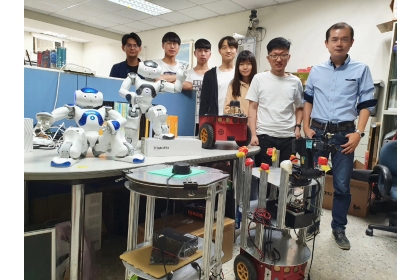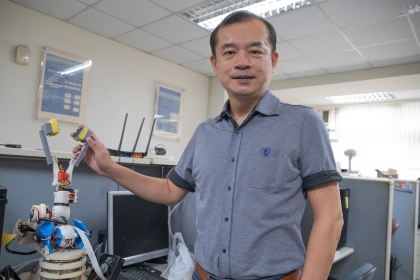Chia-Feng Juang Makes Artificial Intelligence Learning More Efficient and Wins the Outstanding Research Award of Ministry of Science and Technology
2021-11-23 13:41:33
興新聞張貼者
Unit秘書室
2,065
The "artificial neural network" and "fuzzy system", which are widely used in artificial intelligence, are the concept of imitating the human brain to learn and give instructions. The "neuro-fuzzy system learning algorithm" and "evolutionary reinforcement learning algorithm" proposed by Professor Chia-Feng Juang from the Department of Electrical Engineering of National Chung Hsing University make artificial intelligence learning more efficient, and can further realize the function of "biomimetic learning” gradually. It has been successfully applied to robot self-learning control, navigation, computer vision object recognition, and medical assisted diagnosis, laying the computing foundation of modular kits for the artificial intelligence of the domestic enterprises and medical field. After his hard work, effort and commitment through years, Professor Chia-Feng Juang has won the "Outstanding Electrical Engineering Professor Award" of the Chinese Institute of Electrical Engineering. Internationally, Professor Juang is a Distinguished Lecture of the Institute of Electrical and Electronics Engineers (IEEE) Computational Intelligence Society, also affirmed by the Outstanding Research Award from Ministry of Science and Technology this year.
Chia-Feng Juang pointed out that, compared with traditional artificial intelligence, the "evolutionary reinforcement learning algorithm" he developed imitates the behavior of natural species "collective intelligence" for collective cooperative learning operations, such as robots walking along walls and avoiding obstacles. The learning effect and efficiency are greatly boosted, the flexibility of the robot is improved, and more home services and production line manufacture can be carried out.
Medically, the "neuro-fuzzy system" is used to quickly predict the severity of sleep apnea and for the treatment end to predict the optimal pressure of the positive airway pressure, reducing the burden on medical personnel and improving the accuracy of rapid prediction. The same principle is also applied to "circuit board defect detection", and even "artificial defects" can be created to allow the system to generate contingency strategies and improve the ability to learn and cope with changes. This has advanced to the stage of "deep learning".
Chia-Feng Juang’s "evolutionary reinforcement learning algorithm", "neuro-fuzzy system", and "deep learning algorithm" can propose learning algorithms and artificial intelligence model solutions for different application problems, and also make the operation of artificial intelligence to no longer be independent "black boxes", providing construction methods and improving the "reliability and interpretability". The ever-changing artificial intelligence is even smarter, more powerful in learning, and more effective than human beings.
Chia-Feng Juang pointed out that, compared with traditional artificial intelligence, the "evolutionary reinforcement learning algorithm" he developed imitates the behavior of natural species "collective intelligence" for collective cooperative learning operations, such as robots walking along walls and avoiding obstacles. The learning effect and efficiency are greatly boosted, the flexibility of the robot is improved, and more home services and production line manufacture can be carried out.
Medically, the "neuro-fuzzy system" is used to quickly predict the severity of sleep apnea and for the treatment end to predict the optimal pressure of the positive airway pressure, reducing the burden on medical personnel and improving the accuracy of rapid prediction. The same principle is also applied to "circuit board defect detection", and even "artificial defects" can be created to allow the system to generate contingency strategies and improve the ability to learn and cope with changes. This has advanced to the stage of "deep learning".
Chia-Feng Juang’s "evolutionary reinforcement learning algorithm", "neuro-fuzzy system", and "deep learning algorithm" can propose learning algorithms and artificial intelligence model solutions for different application problems, and also make the operation of artificial intelligence to no longer be independent "black boxes", providing construction methods and improving the "reliability and interpretability". The ever-changing artificial intelligence is even smarter, more powerful in learning, and more effective than human beings.



